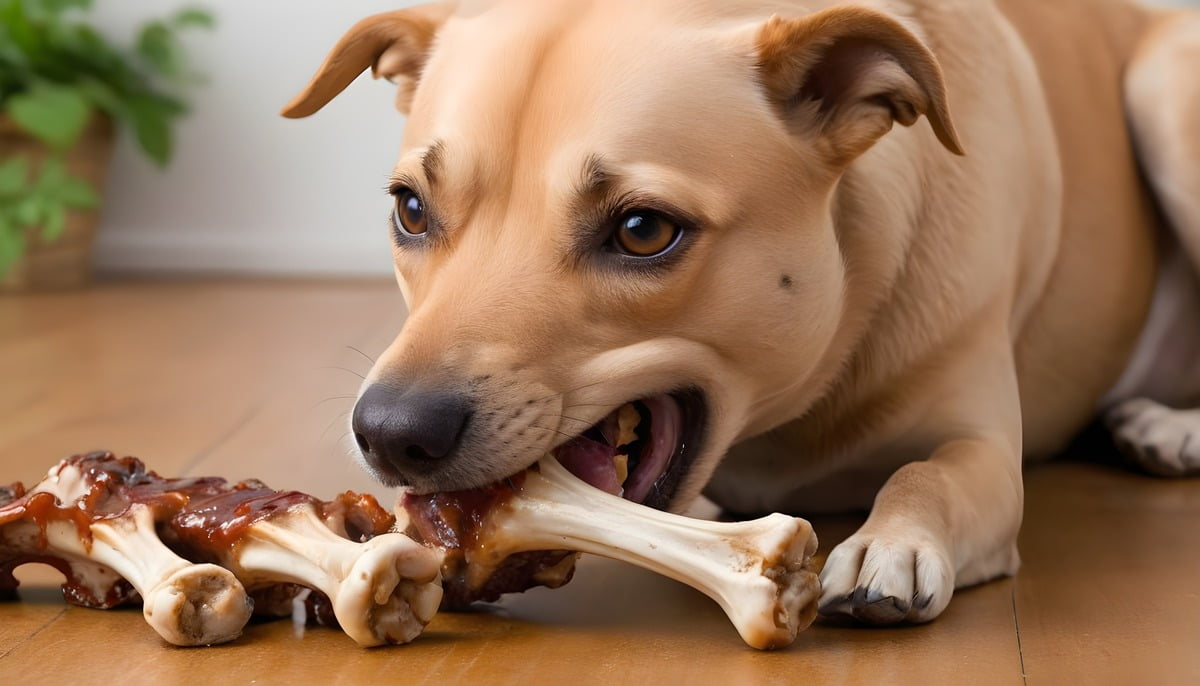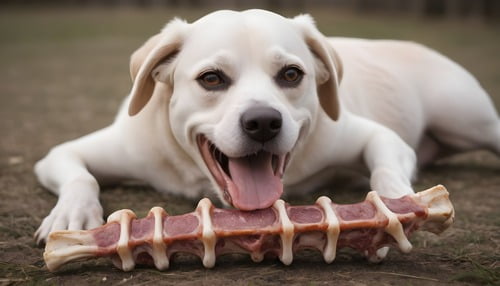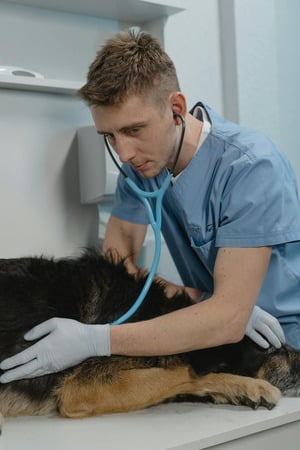
Envision coming domestic to discover your hairy companion, tail swaying enthusiastically, having reveled in a taboo treat – a plate of rib bones. As much as we cherish spoiling our canine companions, certain liberalities can have unfavorable impacts on their well-being. One such result is the advancement of diarrhea, a common gastrointestinal issue in dogs. In this article, we’ll dive into the repercussions of a dog devouring rib bones and enduring the runs, investigating the dangers, side effects, quick activities to require, veterinary care, domestic administration, and anticipation techniques to guarantee your pet’s well-being.
Table of Contents
dog ate rib bones now has diarrhea?

Understanding the Dangers
The picture of a dog chewing on a bone is notorious, but it’s basic to get the potential risks related to this movement. Whereas bones are frequently seen as characteristic chew toys for dogs, they can pose critical dangers to their well-being. Devouring bones, particularly cooked bones like rib bones, can fragment and cause wounds to a dog’s mouth, throat, esophagus, stomach, and guts. These sharp parts can cut or discourage the stomach-related tract, leading to genuine complications such as gastrointestinal puncturing or blockage.
Signs and Indications of the Runs in Dogs
The runs may be a predominant gastrointestinal clutter in dogs, characterized by free or watery stools. It’s significant for pet proprietors to recognize the signs and indications of the runs to address the issue expeditiously. Common markers incorporate expanded recurrence of bowel developments, criticalness to poo, straining amid bowel developments, nearness of blood or bodily fluid in stool, and going with indications like heaving dormancy, or misfortune of craving. The runs can be caused by different components, counting dietary tactlessness, irresistible operators, dietary hypersensitivities or intolerances, stretch, or underlying medical conditions.
Quick Activities to Require
Upon finding that your dog has loose bowels after expending rib bones, it’s imperative to require prompt activity to lighten their distress and avoid advanced complications. Begin by expelling any remaining bones or nourishment from your dog’s reach to avoid additional ingestion. Another, assess the seriousness of the loose bowels and contact your veterinarian for direction. Within the intervals, you’ll give steady care by guaranteeing your dog remains hydrated and altering their eat-less to insipid, effectively edible nourishments such as bubbled chicken and rice.
Veterinary Examination and Treatment

A veterinary examination is basic for dogs encountering diarrhea, particularly if it endures or worsens over time. Amid the examination, your veterinarian will conduct a careful physical evaluation and may suggest demonstrative tests such as fecal examination, blood tests, or imaging to decide the fundamental cause of the runs. Treatment choices may change depending on the conclusion but may incorporate drugs to control indications, dietary adjustments, probiotics to reestablish intestine wellbeing, or intravenous liquids for lack of hydration.
Domestic Care and Administration
Whereas veterinary care is pivotal for tending to diarrhea in dogs, domestic care, and administration play a noteworthy role in the recuperation handle. Take after your veterinarian’s proposals concerning slimming down, pharmaceutical organization, and observing your dog’s condition. Give a bounty of new water to avoid drying out and energize your canine to rest. Maintain a strategic distance from nourishing them with table scraps or treats that seem to worsen their gastrointestinal trouble. Screen the recurrence and consistency of your dog’s bowel developments, and contact your veterinarian if there are any concerning changes or need for enhancement.
Veterinary Examination and Treatment
A veterinary examination is basic for dogs encountering the runs, particularly if it endures or declines over time. Amid the examination, your veterinarian will conduct an exhaustive physical appraisal and may prescribe symptomatic tests such as fecal examination, blood tests, or imaging thinks about to decide the basic cause of the runs. Treatment alternatives may shift depending on the conclusion but seem to incorporate solutions to control side effects, dietary alterations, probiotics to reestablish intestine wellbeing, or intravenous liquids for parchedness.
Home Care and Management
While veterinary care is crucial for addressing diarrhea in dogs, domestic care and management play a significant function in the healing process. Follow your veterinarian`s recommendations concerning eating regimen, medicine management, and tracking of your dog`s situation. Provide lots of sparkling water to prevent dehydration and inspire your dog to rest. Avoid feeding them table scraps or treats that could exacerbate their gastrointestinal distress. Monitor the frequency and consistency of your dog’s bowel moves, and phone your veterinarian if there are any changes or lack of improvement.
Prevention Tips
Preventing your canine from ingesting rib bones or some other hazardous objects is key to heading off gastrointestinal troubles like diarrhea. Instead of bones, offer your dog safe and suitable bite toys designed mainly for dog use. Supervise your canine in the course of meal instances and discourage scavenging behavior. Consider crate training or confining your canine to a safe region while unsupervised to save you get admission to probably dangerous objects. Additionally, prioritize everyday veterinary tests. S.A. To cope with any underlying fitness issues and maintain your canine`s common well-being.
Conclusion
In the end, the situation where a dog ate rib bones now has diarrhea? of a dog consuming rib bones and subsequently growing diarrhea underscores the importance of responsible pet possession and proactive healthcare control. By informing them, of the risks, spotting the signs and symptoms, taking instantaneous movement, looking for veterinary care, imposing domestic management techniques, and prioritizing prevention, pet proprietors can shield their canine companions from gastrointestinal troubles and promote their lengthy-time period fitness and happiness. Remember, in terms of your dog’s fitness, vigilance and set-off interventions are paramount.
Can dogs eat rib bones?
No, it’s not secure for dogs to eat rib bones or any cooked bones. Cooked bones can chip and cause genuine wounds to a dog’s stomach-related tract.
What ought I do in case my dog has loose bowels after eating rib bones?
If your dog has the runs after eating rib bones, expel any remaining bones, screen their condition closely, and contact your veterinarian for directions. Guarantee your canine remains hydrated and consider nourishing them with insipid, effectively edible nourishments.
How can I prevent my dog from getting loose bowels from rib bones?
Avoid your dog from devouring rib bones or any perilous objects by advertising secure chew toys, administering supper times, and debilitating rummaging behavior. Normal veterinary check-ups are significant to preserve your dog’s general well-being and anticipate gastrointestinal issues.
